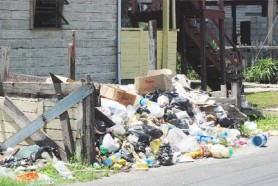Against the backdrop of yet another urban garbage disposal crisis resulting from the withdrawal of services by private collectors owed millions of dollars by a cash-strapped and increasingly beleaguered Mayor and City Council (M&CC), representatives of the municipality met top private sector officials last week to discuss how the two sides can work together to help the council secure the hundreds of millions of dollars in outstanding rates and taxes owed by urban business houses.

However, while both the Private Sector Commission (PSC) and the Georgetown Chamber of Commerce and Industry (GCCI) have agreed in principle to support the move to have Georgetown businesses pay up their outstanding liabilities to the city, the private sector team at the July 1 meeting pilloried the M&CC for what it says is an operating environment characterized by gross incompetence, particularly in the management of the city’s financial affairs.
High on the list of the private sector’s concerns is the inability of City Hall to produce a verifiable record of the business community’s liabilities; a circumstance which both sides attending the meeting agree could seriously affect any effort to have the debts settled. In response to criticisms by both PSC Chairman Ramesh Dookhoo and GCCI President Komal Ramnauth of the city’s failure to maintain reliable financial records and effectively manage its debt-collection service, Deputy Mayor and Chairman of City Hall’s Finance Committee Robert Williams told the meeting that the municipality was in the process of verifying its records as a preparatory step to recovering outstanding monies.
While it is believed that the city may be owed around $2 billion in rates and taxes, City Hall is unable either to verify that figure or to state how much of that amount is owed by the business community. This newspaper has learnt that recent attempts to effect collections from some business houses based on a list produced by City Hall proved unworkable since it transpired that some of the information provided on the list was inaccurate.

While Williams is on record as saying that the municipality will be seeking to garner at least some of the outstanding rates and taxes this year, a verifiable list of debtors must await remedial work currently being undertaken with the support of an Implementation Committee set up to assist City Hall in improving its service delivery capacity. Keith Burrowes, Chairman of last year’s Commission of En-quiry into the operations of City Hall, who is also spearheading the Implementation Committee told Stabroek Business several weeks ago that the inability of City Hall to produce accurate records could make its efforts to collect outstanding rates and taxes doubly difficult.
The July 1 meeting explored various options which City Hall might pursue in order to garner at least some of the outstanding rates and taxes owed by the private sector. The meeting agreed that long-outstanding debtors to the council could be targeted to pay up long-overdue rates and taxes while some of the more recent debts could await City Hall’s verification process. Burrowes, who says it is desirable for the business community to help the council ease some of its current financial burden, said the admitted weaknesses of City Hall “should not allow us to lose sight of the fact that the municipality is owed millions of dollars in outstanding rates and taxes anyway.” Apart from the need to rectify its existing records, Burrowes has also said that the municipality needs to address the issue of creating an effective long-term debt management regime supported by adequate human and technical resources, pointing out that failure to improve the city’s operating infrastructure as a prerequisite to seeking to secure and manage higher levels of revenue was likely to lead to a regimen of more costly financial mismanagement.
Meanwhile, the meeting also saw a suggestion from the private sector team that City Hall give consideration to waiving part or all of the millions of dollars of interest accumulated on outstanding rates and taxes. However, Williams told the meeting that such an option could not be considered outside the framework of a broader and serious commitment on the part of defaulters to make overdue payments to the city.
Even as the meeting sought to arrive at a modus vivendi that would facilitate the two sides working together to ensure that City Hall secures some measure of badly needed financial relief, the private sector delegation continued to cite concerns over other aspects of the municipality’s operations. The issue of the viability of City Hall continuing to operate some non-core services at the expense of those services which it is obliged to provide, a point raised in the Report of the Burrowes Commission, surfaced at the meeting. Specifically, the PSC Chairman pointed to the six Municipal Day Care Centres currently being operated by the Council in Georgetown and its environs, declaring that the council might wish to give serious consideration to the privatization of those services.
Meanwhile, Williams used the forum of the July 1 meeting to raise once again the protracted delay in applying the adjusted Valuation Roll completed seven years ago under the IDB-funded Urban Development Programme. This, he said, was likely to see a number of one-time urban dwelling houses which have long been converted into business premises attracting rates and taxes based on 250 per cent of their assessed value rather than the 40 per cent that currently obtains. Williams told the meeting that City Hall has as yet been unable to obtain the new Valuation Roll from government, an argument which City Hall has used to suggest that central government is deliberately starving the city of funds.
Meanwhile, Williams told the meeting that City Hall is also seeking the support of the private sector in its efforts to bring to an end the indiscriminate disposal of garbage in the city by some business houses. The council, Williams told the meeting had compiled a list of some of the offenders. However, according to Dookhoo, the private sector is not in possession of such a list. Burrowes, who was present for part of the meeting, has suggested that monitoring mechanisms could be put in place to detect indiscriminate dumping of garbage by business houses and that the evidence garnered could be used in support of action against the offenders.
The Heads of both the PSC and the GCCI have said that City Hall should pursue the option of the courts in order to secure payment of rates and taxes from defaulters to which Williams responded that legal action had already been taken against more than 60 defaulters.




